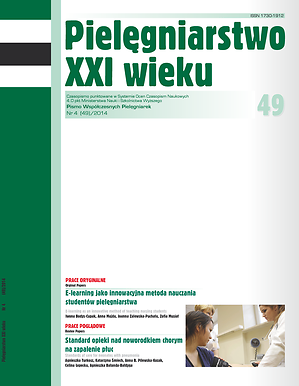Nurses’ opinion about the frequency of medical errors in daily practice
Keywords:
medical error, nurse, nursing staffAbstract
Introduction. Medical errors or medical malpractice may affect not only a doctor, but also every healthcare professional, including nurses. Medical errors and adverse events are most commonly divided based on the criterion of the treatment phase. This error may be diagnostic – at the diagnosis-making stage, therapeutic - incorrect treatment related to an incorrect diagnosis, wrong dose or the wrong drug, technical error - associated with improperly taken surgery, organizational error - poorly organized help to the patient negatively affecting the patient.
Aim. The aim of the study was to identify the respondents’ opinion on the incidence of medical errors in daily practice and to try to classify them.
Material and method. The research was conducted in the first and second quarters of 2012 using the authors’ own questionnaire among 158 nurses working in surgical wards, general medicine ward and primary healthcare.
Results. Adverse events in nursing practice occur frequently. Adverse events should be monitored and reported. More time should be taken to discuss issues related to medical errors during the nurses training
References
1. Fiutak A. Klasyfikacja błędów medycznych. Medycyna Rodzinna. 2010; 2(54): 50-55.
2. Marczewska S. Błąd zawodowy pielęgniarki. Podawanie leków. MPiP. 2011; 5: 12-13.
3. Ioannidis JPA, Lau J. Evidence on interventions to reduce medical errors. An overview and recommendations for future research. JGIM. 2001; 5(16): 325-334.
4. Vincent C, Neale G, Woloshynowych M. Adverse events in British hospitals: preliminary retrospective record review. BMJ. 2001; 322: 517-519.
5. Bates DW. Using information technology to reduce rates of medical errors In hospitals. BJM. 2000; 320: 788–791.
6. Blendon RJ, DesRoches CM, Brodie M, et al. Patient safety: views of practicing physicians and the public on medical errors. N Engl J Med. 24(347); 2002: 1933-1940.
7. Fortescue EB, Kaushal R, Landrigan CP, et al. Prioritizing strategies for preventing medication errors and adverse drug events in pediatric inpatients. Pediatrics. 2003; 4Pt (111):722-729.
8. Phillips J, Beam S, Brinker A, et al.. Retrospective analysis of mortalities associated with medication errors. Abstract za: Am J Health Sys Pharm. 2001;19(58):1835-1841.
9. Suresh G, Horbar JD, Plsek P, et al. Voluntary anonymous reporting of medical errors for neonatal intensive care. Pediatrics. 2004; 6(113): 1609-1618.
10. Ross LM, Wallace J, Paton JY. Medication errors in a paediatric teaching hospital in the UK: five years operational experience. Arch Dis Child. 2000; 6(83): 492-497.
11. Aiken LH, Clarke SP, Cheung RB, et al. Educational levels of hospital nurses and surgical patient mortality. JAMA. 2003; 12(290): 1617-1623.
12. Aiken LH, Clarke SP, Sloane DM, et al. Hospital nurse staffing and patient mortality, nurse burnout, and job dissatisfaction. JAMA. 2002; 16(288): 1987-1993.
13. Bond CA, Raehl CL, Franke T. Medication errors in United States hospitals. Pharmacotherapy. 2001; 9(21): 1023-1036.
14. Mayo AM, Duncan D. Nurse participations of medical errors. J Nurse Care Qual. 2004; 3(19): 209-217.
15. Flynn ES, Barker KN, Pepper GA, et al. Comparison of methods for detecting medication errors in 36 hospitals and skilled-nursing facilities. Am J Health Sys Pharm. 2002; 5(59): 436-446.
16. Needleman J, Buerhaus P, Pankratz S, et al. Nurse staffing and inpatient hospital mortality. NEJM. 2011; 11(364): 1037-1045.
17. Ahuja N, Zhao W, Xiang H. Medical errors in pediatric patients with chronic conditions. Pediatrics. 2012; 4(130): 786-793.
Downloads
Published
Issue
Section
License
Copyright (c) 2014 Authors

This work is licensed under a Creative Commons Attribution 4.0 International License.




